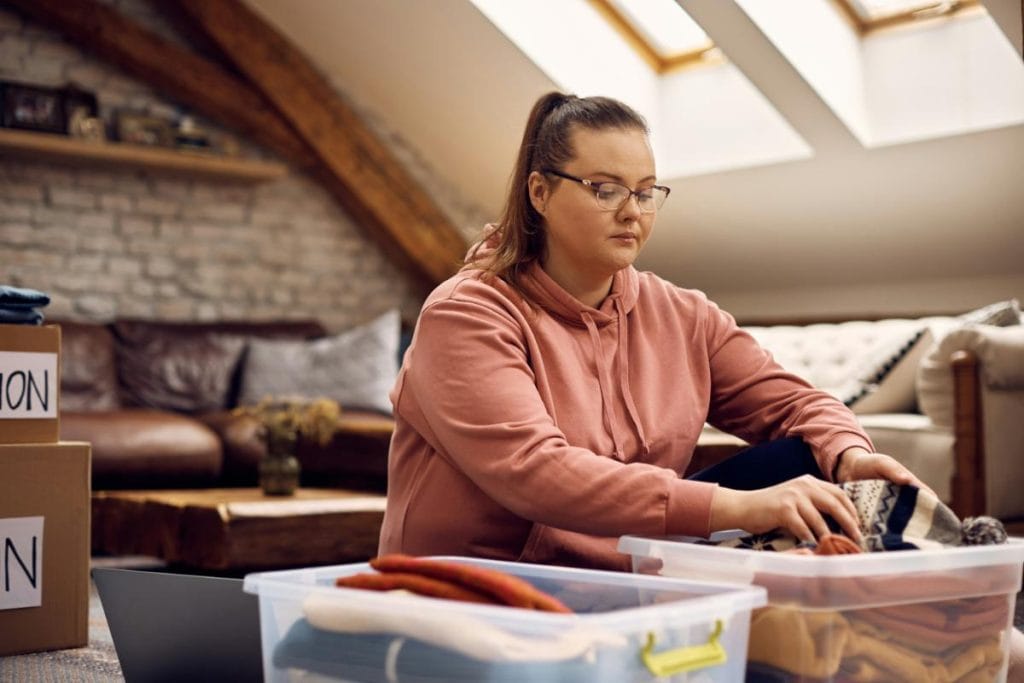
In a world that values more and more stuff, more activities, more responsibilities, it’s easy to lose track of how much clutter we accumulate in our physical and mental spaces. The truth is, clutter can have a profound impact on our well-being. We often don’t realize how deeply our environment affects us until we start to let go of the things that no longer serve us.
In this article, we explore the emotional and psychological benefits of decluttering and provide a simple yet effective strategy to help you achieve inner peace.
The Link Between Clutter and Stress
The connection between clutter and stress isn’t just a matter of aesthetics. Research consistently shows that living in a cluttered environment can negatively impact our mental health. When surrounded by disorganized spaces, the brain is forced to work harder to process visual stimuli, resulting in increased cortisol levels, the primary stress hormone. This means that a messy space can trigger anxiety, make it harder to focus, and even hinder creativity.
Clutter often symbolizes unfinished tasks or unresolved decisions. This mental burden can weigh on us, even if we’re not consciously aware of it. Every item in our homes and workspaces holds a tiny bit of mental energy. The more things we have, the more energy it takes to maintain them, even when they aren’t being used.
The Emotional Benefits of Decluttering
Decluttering isn’t just about clearing physical space—it’s about clearing mental space as well. When you start the process of letting go, you may experience a sense of relief. This feeling comes from the act of releasing attachment to things that no longer contribute positively to your life.
One of the most profound emotional benefits of decluttering is the shift towards mindfulness. By thoughtfully evaluating our belongings, we become more attuned to what we truly need and value. This process fosters a sense of gratitude for what we have, as well as a deeper connection to the present moment.
Decluttering also opens up space for more positive emotions. It encourages a sense of accomplishment and control. As the space around us becomes more organized, we may notice a boost in energy and mood, making us feel lighter and more focused. In turn, this emotional clarity can help us make more intentional choices, leading to a more peaceful and fulfilling life.
Decluttering Strategy
Step 1: Set Clear Intentions
Before diving into the decluttering process, it’s essential to set clear intentions. This is the first step in ensuring that the process is effective and emotionally rewarding. Ask yourself why you want to declutter. Is it to reduce stress? To create a more functional space? To make room for new opportunities in your life? Understanding your motivations will help guide the entire process.
The goal is not just to clear space, but to release what no longer aligns with your values. By focusing on why you’re decluttering, you can stay grounded throughout the process and avoid feeling overwhelmed.
Step 2: Start Small
Decluttering an entire home or office can feel like a daunting task. But if you break it down into smaller, manageable steps, the process becomes much more approachable. Start with a single room, a drawer, or even a small section of your desk. As you clear each area, you’ll experience a sense of progress, which will keep you motivated to continue.
It’s often helpful to focus on high-traffic or high-stress areas first. For example, if your kitchen is constantly cluttered with dishes, papers, and random items, tackling it early on will provide immediate relief. Small victories will build momentum and make larger tasks feel more achievable. You might even find that once you’ve decluttered, you need the help of the best moving company to handle the heavy lifting of sorting and transporting belongings that you no longer need.
Step 3: Evaluate Your Possessions
When you’re ready to start sorting through your belongings, ask yourself three key questions for each item:
- Does it add value to my life?
- Does it spark joy or serve a practical purpose?
- Is it necessary?
The “Keep, Donate, Toss” method is a simple and effective strategy. Begin by identifying what you need or love, and keep only those items. Anything that doesn’t pass the test should either be donated to someone who can use it or thrown away.
The process can be complex, especially when parting with sentimental items. However, remember that the goal is not to forget the memories attached to these items, but to free yourself from the emotional baggage they may carry. Sometimes, letting go of physical items allows you to hold on to the memories without the weight.
Step 4: Embrace Minimalism
Minimalism is not about depriving yourself, but about focusing on what truly matters. When you adopt a minimalist approach to decluttering, you prioritize quality over quantity. This mindset will help you make thoughtful decisions about what to keep and what to let go of.
In the beginning, it might feel like you’re removing too much, but you’ll soon discover that the things you keep are the ones that add real value to your life. Minimalism encourages you to curate your environment in a way that promotes calm and peace, helping you avoid the trap of consumerism and excess.
Step 5: Maintain Your Space
Decluttering is not a one-time event but an ongoing practice. Once you’ve cleaned and organized your space, it’s essential to establish habits that prevent clutter from building up again. Make it a habit to regularly reassess your possessions, even if it’s just once every few months.
Establish systems for maintaining order, such as designating specific spaces for items, keeping your surfaces clear, and staying mindful of what enters your space. The less clutter you accumulate, the easier it becomes to maintain a peaceful and organized environment.
Decluttering for Different Areas of Life
While physical decluttering is often the most visible and immediate, other areas of life can benefit from a similar approach.
Physical Space
Decluttering your home, office, or any other space where you spend a significant amount of time is the first and most obvious step. A clean and organized space has a direct impact on your mental clarity and overall well-being. When your surroundings are tidy, your mind is more likely to be calm and focused.
Digital Decluttering
In today’s digital world, our devices are often just as cluttered as our physical spaces. Cleaning up your digital life—such as organizing files, clearing your inbox, or deleting unused apps—can have a profound impact on your mental space. The constant influx of notifications and emails can cause anxiety, but decluttering your digital environment can help reduce that stress and create a more organized workflow.
Emotional Decluttering
Emotional decluttering involves letting go of toxic relationships, negative thought patterns, and emotional baggage that is no longer necessary. This type of decluttering may take longer, but it’s just as important as clearing physical or digital space. By addressing these emotional burdens, you make room for positive experiences and personal growth.

The Long-Term Effects of Decluttering on Inner Peace
As you continue with the practice of decluttering, you’ll start to notice more long-term benefits. A decluttered environment fosters mental clarity, which enhances focus and creativity. It also reduces decision fatigue, as you no longer have to sift through excess items or distractions.
Living with less can bring a sense of peace and satisfaction. Over time, you’ll find that you’re more intentional with your possessions, and your space reflects a clearer, more focused mindset. This simplicity can be incredibly freeing, allowing you to focus on what truly matters—whether that’s personal growth, relationships, or your passions.
Make Room for What Truly Matters
Decluttering is not just about getting rid of physical possessions; it’s a practice that invites peace, mindfulness, and intentional living into your life. The process of letting go, while sometimes challenging, can bring clarity and freedom from the emotional and mental clutter that often holds us back.
By following a clear strategy, embracing minimalism, and maintaining your space, you can create an environment that supports your inner peace. Whether you start with a single room or embark on a complete lifestyle shift, the benefits of decluttering are clear: a simplified life leads to a more fulfilled and peaceful existence. Take the first step today and begin letting go of what no longer serves you. The peace you seek is just a decluttered space away.
